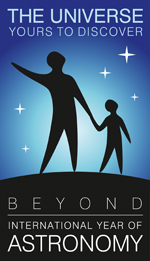Cosmos in the Classroom 2010 and Making Connections in Education and Public Outreach
13 January 2010
Now that IYA is done and the long-term legacy plans are under way, this is a good time to reflect on and evaluate what we achieved and were not able to achieve. What long-term lessons can we take away from this massive international effort for the field of astronomy education and outreach? How will these lessons affect the programs we offer in years to come?
A good place to share such reflections and work with other education and outreach professionals on planning for the future will be the summer meeting of the Astronomical Society of the Pacific -- a meeting devoted to educational and outreach topics:
The 122nd Annual Meeting of the Astronomical Society of the Pacific (ASP), will be held July 31 - Aug. 4, 2010 at the University of Colorado in Boulder, in one of the most beautiful settings in the U.S.. The meeting features two concurrent 3-day conferences on Aug. 2 - 4:
* Cosmos in the Classroom 2010: A Hands-on Symposium on Teaching Introductory Astronomy
* Making Connections in Education and Public Outreach: A Meeting for Those Working in EPO.
You can now sign up to be notified as program and registration information becomes available at: http://www.astrosociety.org/events/meeting.html.
As in previous Cosmos and EPO conferences hosted by the ASP, we will devote much of the time to hands-on workshops, where we can "practice what we preach". We will also have panels, poster papers, a "share-a-thon" room for putting out materials we are proud of, and time for formal and informal networking with people who teach or work in settings similar to yours.
Cosmos attendees will include astronomy instructors from high schools, community colleges, liberal arts colleges, state universities, research universities, and informal science institutions. We especially welcome those who are teaching part time or are just starting to teach.
EPO conference attendees will include scientists, K-12 teachers, university educators, informal educators (e.g. museums, planetaria, parks), public communicators, science writers, and other EPO professionals. All are welcome who work on or support EPO projects in space science or earth science (including such fields such as physics, astrophysics, heliophysics, planetary science, and astrobiology).
Besides facilitating networking opportunities within each conference’s respective audience, the 2010 ASP Annual Meeting will feature plenary sessions aimed at bringing both groups together, and enabling greater dialogue and interactions among all attendees. We will arrange sessions joining instructors and EPO professionals, focusing on what kinds of information and what kinds of materials are most useful in classrooms, and how Astro 101 and EPO professionals can collaborate to their mutual benefit. A set of weekend workshops (July 31-August 1) will precede the two conferences.
We are working to make scholarships available to educators whose budgets would not ordinarily allow them to come, but these will be limited in number. If you can apply for travel through your own institution, we hope you can pursue that.
A method of proposing sessions and papers will be available at the ASP web site in early 2010. In the meantime, we hope you will start thinking about the kinds of activities you would like to see and do at the meeting. If you have suggestions for interesting approaches for the meeting program committee to consider, please contact one of the undersigned directly.
Andrew Fraknoi (Cosmos Program Sub-committee): fraknoiandrew@fhda.edu
Greg Schultz (EPO Program Sub-committee): gschultz@astrosociety.org
Search IYA2009 Updates

National Nodes: 148
Organisational Nodes: 40
Organisational Associates:33
National Websites: 111
Cornerstone Projects: 12
Special Task Groups: 11
Special Projects:16
Official Products:8
Media Partners:22


